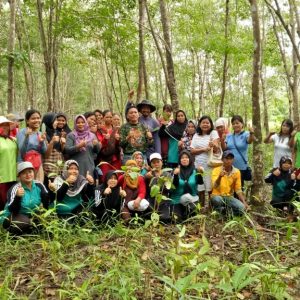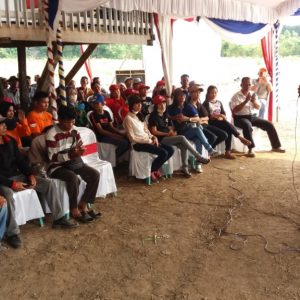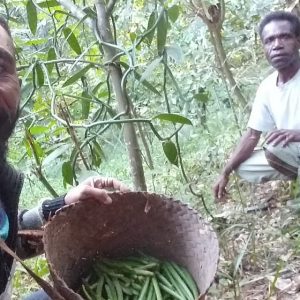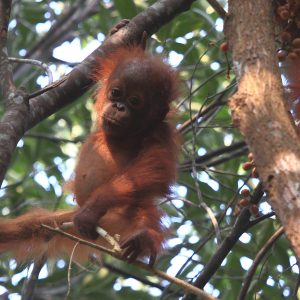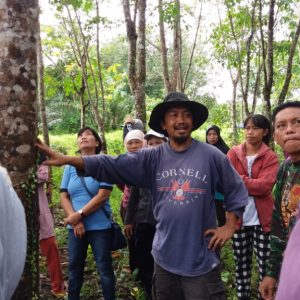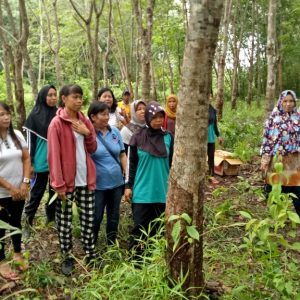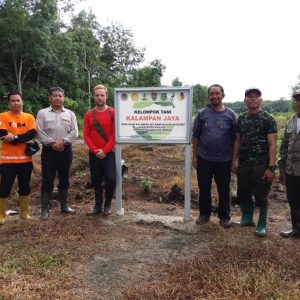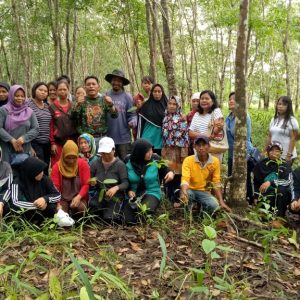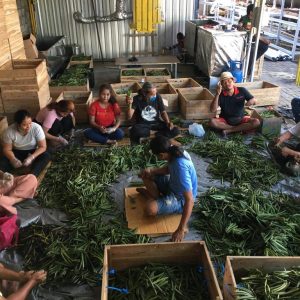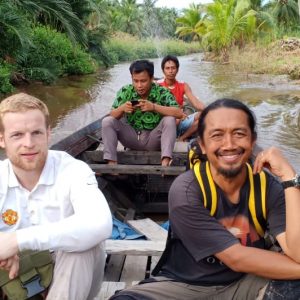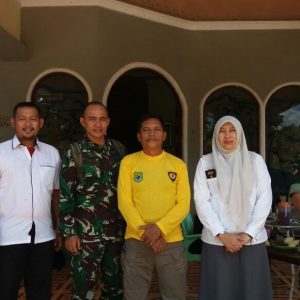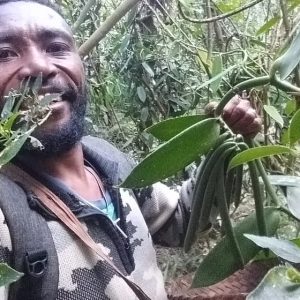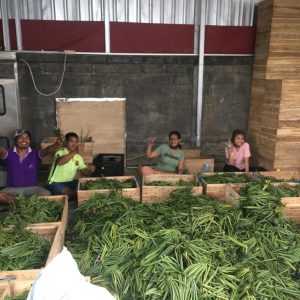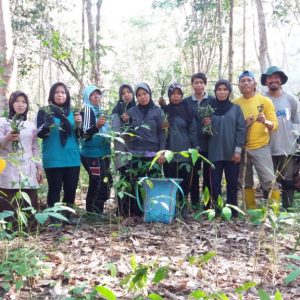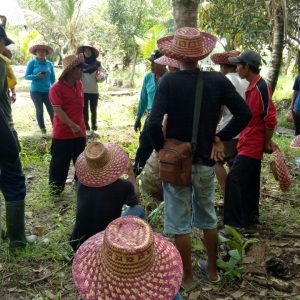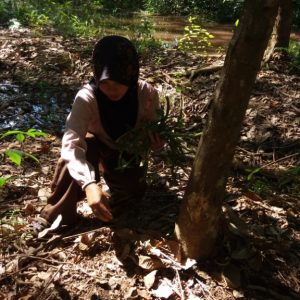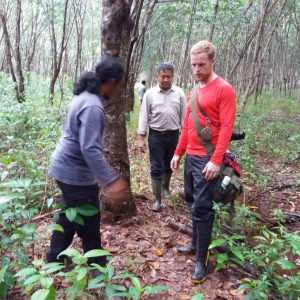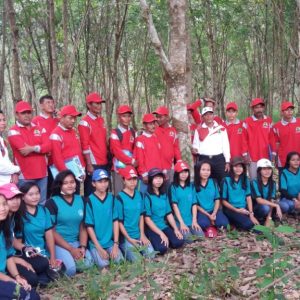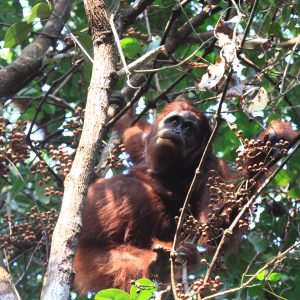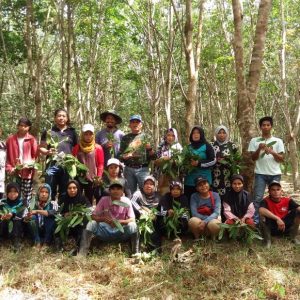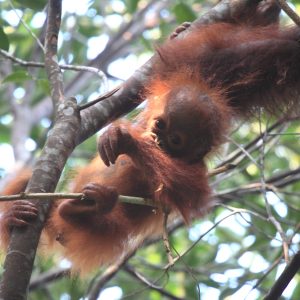About Us
We partner with and train forest communities to revive traditional forest gardening production techniques that restore and regenerate forest ecosystems while protecting habitats for endangered wildlife.
Poor forest management and production systems result in forest degeneration, disempowerment of indigenous communities, and accelerated climate change.
We exist to solve this problem.
We cultivate and process non-timber forest products (NTFP) for global markets, by supporting forest communities to adopt “climate-smart” agriculture at scale.
At the heart of climate-smart agriculture is the revitalization of the indigenous traditions of forest “gardening” culture. These farming practices are ecologically and socially regenerative. We support the sustainability and scaling of climate-smart agriculture by establishing government and village partnerships and connections to global markets.
Our values enable us to revitalize Indonesian forest “gardening” culture:
Honesty, equity, and fairness – We cultivate trust through honesty, and treat one another equitably in our relationships and business arrangements—particularly with the forest communities whom we serve.
Inclusivity and empowerment – We are global, diverse, tolerant, and inclusive. We believe in empowering forest farmers—especially women—through our work.
Protection and restoration of forests and peatlands – When faced with tough decisions, we prioritize what is best for forests and peatlands, and the communities that live within them. We aim not only to maintain—but expand—forest cover. We treasure biodiversity, enable fire prevention, and believe in zero-deforestation.
Long-term – We are invested in the long-term success of Indonesian forests and their communities. We take a long-term approach to building human, social and natural capital in the areas we work.
Our History
2017
We started by providing vanilla and pepper seedlings to farmers in Borneo and training them to plant the spices in the forest. Word quickly spread of our concept to produce vanilla and other non-timber forest products in state-managed forested areas that by law can no longer be cleared for agriculture. Together with local farmers, we began regenerating secondary forest and abandoned rubber plantations. The approach is viewed by the Dayaks as reviving indigenous forest gardening culture – an honorable and welcome alternative to extractive and monoculture agriculture projects.
Conservana Spices was established in Indonesia and a firm partnership forged with Pollinium, based in the UK. Roles are split so that operations within Indonesia are led by Conservana, and Pollinium is responsible for marketing the outputs to global supply chains. In 2018, a public-private partnership was formed with Kapuas and South Barito, two regencies on Borneo Island with responsibility for managing over 200,000 Ha of suitable forested landscapes. In the first year of these relationships more than 75,000 vanilla seedlings were planted in sites with the help of rural communities and the Muslim Women’s Forest Group.
2018
2019
We developed a public-private partnership with the government’s forest management unit near West Bali National Park (Taman Nasional Bali Barat) and began working with rural communities in Alor, Flores and Sumba. Farmers in these areas are experienced in growing vanilla, nutmeg, pepper, coffee, cashew, candlenut, turmeric, cardamom and patchouli. We developed a polyculture system that includes spices and native tree species for the 16,000 Ha bordering the national park. This area was deforested long ago and now zoned for regeneration. Forest-friendly spices are ideal for regenerating rainforest.
Conservana and Pollinium constructed a state-of-the-art curing facility to ensure consistently high-quality vanilla pods. We have begun the application process for verification so our areas of production in can be certified as Wildlife Friendly. Despite the challenges faced while operating during the COVID19 lockdown, we were able to provide skilled employment to more than 20 staff and pay fair prices to our network of 50+ forest communities. Amidst the pandemic and logistical disruptions, our dedicated local partners managed to produce 1 metric tonne of cured vanilla pods.
2020
2021
Pollinum focused on expanding operations and securing supply chains. One of the key achievements during this period was the expansion and training of a dedicated team at the processing facility. This bolstered our capacity and efficiency and consistency in transforming of our products to meet the increasing demand from our customers. We entered into a partnership with Reading University. This collaboration aimed to analyse and assess our gluco-vanillin to vanillin conversion process. The valuable insights and feedback allow us to refine and optimise our processing, ensuring the highest quality standards for our products.
A significant milestone was the formalised agreement we reached with the West Bali Farmers Cooperative, comprising 225 farmers. This collaboration allowed us to directly engage with local farmers, ensuring fair trade practices and supporting their livelihoods. We secured a consistent and reliable supply of raw materials. Building on our expertise in extraction and processing, we ventured into the creation of essential oils. Through meticulous experimentation and refinement, we successfully developed a range of premium essential oils, which resonated positively with our discerning customers.
2022
2023
Founders
Pollinium’s founders met working on the Katingan Project in Borneo,
which is the world’s largest forest carbon initiative. We shared a vision to protect the special animal and plant biodiversity living in rainforest ecosystems while creating economic value for the local communities.
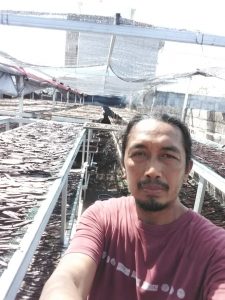
I Made Setiawan
(Co-Founder)
Born in Bali Indonesia, trained in Medical Anthropology and Public Health in Amsterdam University, and University of Illinois at Chicago. For over 15 years Made was involved in HIV/AIDS research and preventive intervention all over Indonesia.
From 2015-17, Made was a consultant for The Katingan Project, the world largest REDD+ and located in central Kalimantan Indonesia.
He worked with the local staff and communities to teach and apply agroforestry and agroecology to end the commonly applied slash and burn technique to create new areas for agriculture.
In 2017, Made co-founded and became CDO of Pollinium to lead efforts in Indonesia to develop vanilla and other non-timber forest products that can benefit forest communities and support the regeneration and protection of globally important forest areas. Made has led the development of our pilot projects and leads the resourcing, training and planting activities throughout Kalimantan.
Nicholas Scott
(Co-Founder)
Born in Scotland, educated in England and studying a Master’s in Agriculture and Development at Reading University. Nicholas worked for 4 years as an Analyst and Portfolio Manager at Permian Global, a fund that invests in REDD+ projects across the tropics.
Visiting many globally significant areas of biodiversity increased his long standing desire to improve rural communities engagement in sustainable agriculture and their access to global supply chains. Therefore, Pollinium’s focus is helping rural communities develop alternative livelihoods that encourages protection and restoration of these important forest ecosystems and the species that inhabit them.
In 2017 Nicholas co-founded Pollinium and became CEO to lead the establishment of the business, raised funds to initiate the pilot projects and leads negotiations with global commodity purchasers.





